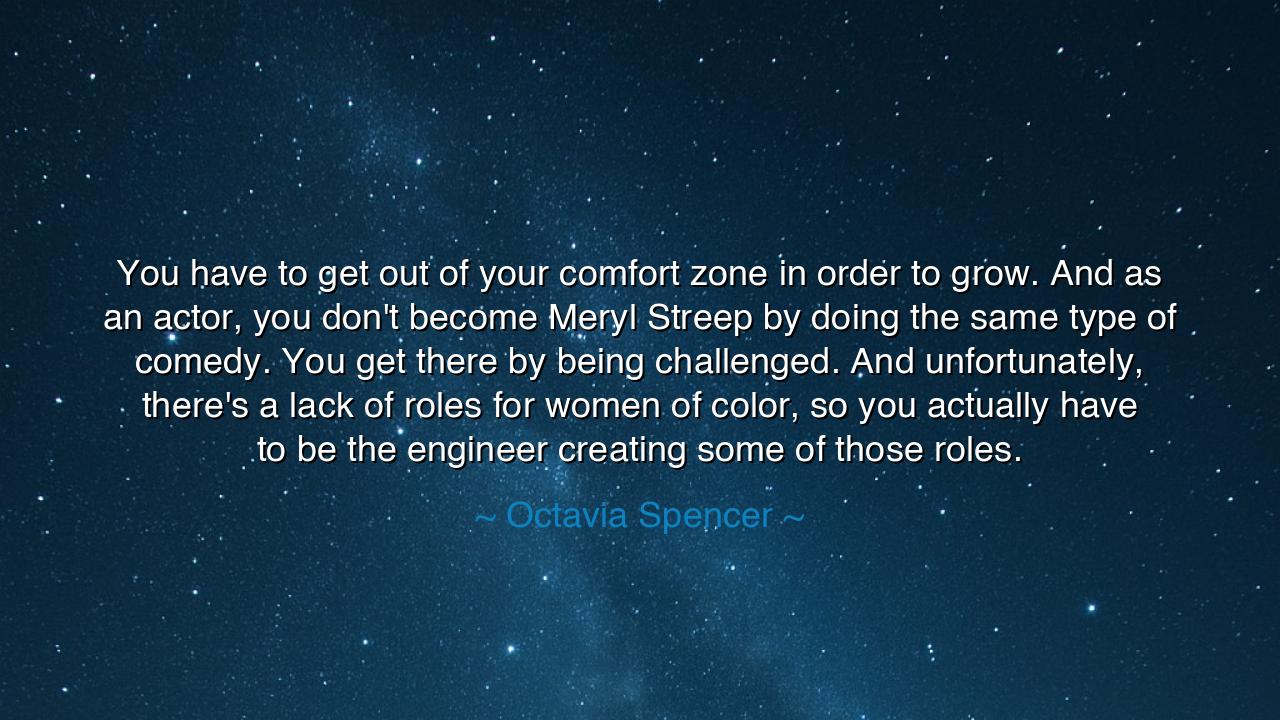
You have to get out of your comfort zone in order to grow. And
You have to get out of your comfort zone in order to grow. And as an actor, you don't become Meryl Streep by doing the same type of comedy. You get there by being challenged. And unfortunately, there's a lack of roles for women of color, so you actually have to be the engineer creating some of those roles.






Hear, O seekers of greatness, the words of Octavia Spencer, who rose from humble beginnings to win the highest honors of her craft: “You have to get out of your comfort zone in order to grow. And as an actor, you don't become Meryl Streep by doing the same type of comedy. You get there by being challenged. And unfortunately, there's a lack of roles for women of color, so you actually have to be the engineer creating some of those roles.” In this saying, she binds together courage, struggle, and creativity, teaching that mastery is born not of ease but of daring.
For the comfort zone is a safe place, but also a prison. To remain within it is to stagnate, never risking failure, never tasting the fire of transformation. Spencer speaks to all artists, but especially to women and women of color, that only by embracing difficulty—roles that stretch the soul, stories that break silence—can one ascend to greatness. It is not repetition but challenge that builds strength, and not familiarity but risk that shapes legends.
Yet she also names a deeper wound: the lack of roles for women of color. In a world where stories are too often written only for the privileged, many are left unseen. For such women, the path is doubly hard—they must not only master their art, but also build the very stage upon which they stand. To be the engineer of one’s own destiny is both burden and triumph, for it means creating opportunities where none were offered.
History gives us a mirror in the life of Josephine Baker. Denied recognition in America, she carried her art to France, where she redefined performance and became an icon. She stepped far beyond her comfort zone, carving new paths when old ones were barred to her. Like Spencer, she understood that when society denies roles, one must create them, even if it means reshaping culture itself.
Therefore, let this wisdom endure: greatness does not come by waiting for opportunity, but by daring to seize and forge it. Growth requires risk, and justice requires creation. Octavia Spencer’s words are both challenge and prophecy—that those who refuse to be confined, who dare to build what is missing, will not only rise themselves but open doors for all who follow. For true artists are not only performers of roles, but creators of worlds.






MHNguyen Minh Hoang
Octavia Spencer makes a valid point about the barriers women of color face in acting, but it also begs the question: how much responsibility should actors bear in creating roles for themselves? Does the expectation that they should 'engineer' their own roles shift the burden from the industry to the individual? How can we ensure that the industry’s leadership recognizes the need for diverse, meaningful roles rather than leaving that responsibility to the actors themselves?
MQTran Minh Quang
Spencer’s words on growth and challenge are an important reminder that we must step out of our comfort zones to achieve greatness. But what about the industries that seem stuck in their ways, especially when it comes to race and gender? Is it fair to put the onus on women of color to 'engineer' their own roles, or should the system be held accountable for its lack of diversity? How do we balance individual empowerment with systemic change?
HHanh
This quote highlights a critical issue in the entertainment industry: the lack of roles for women of color. Spencer’s advice about creating your own opportunities is inspiring, but it also shines a light on a bigger question: How can the industry itself shift to be more inclusive? Is it enough to wait for change, or should there be more direct action to create opportunities that reflect the diverse world we live in?
BVBich Vi
I find this quote powerful because it underscores the need for both personal and industry-wide transformation. The idea of being challenged to grow is crucial, but it’s troubling that women of color still face such systemic barriers in Hollywood. Why is it that the roles are so limited for this group? Shouldn't the diversity of actors be reflected in the roles available to them? How can we challenge this gap more effectively?
GNGau ngu
Octavia Spencer’s point about stepping outside your comfort zone really resonates. Growth often comes when we face challenges, but it’s disheartening that women of color have to fight not only for opportunities but also for roles that are tailored to them. Does this mean the industry itself is failing to create space for diverse talent, or is it up to actors like Spencer to change the system from within? What can we do to accelerate that change?